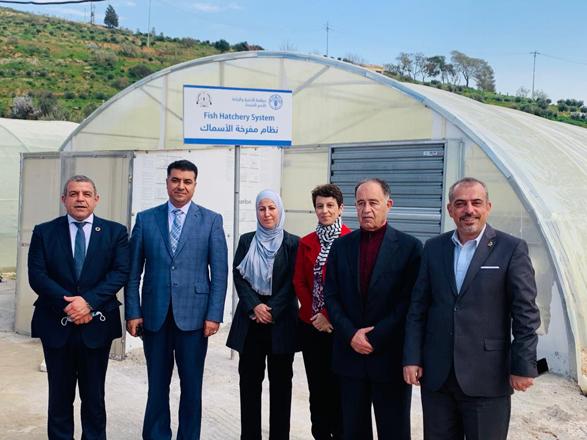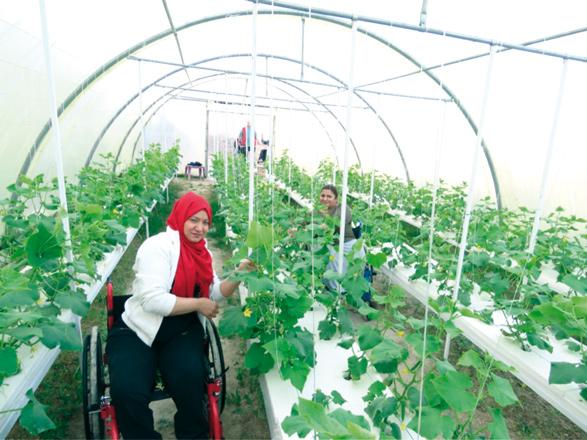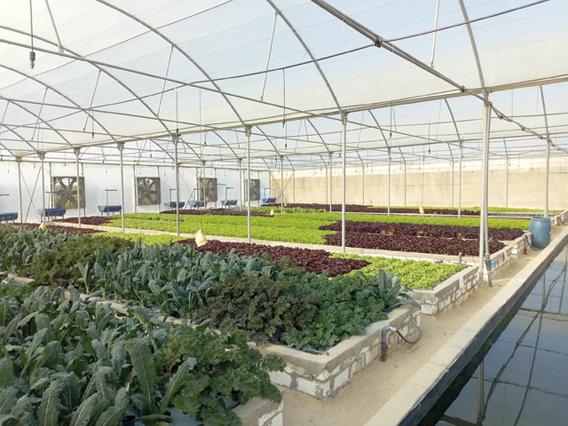You are here
FAO conducts field tour to hydroponics, aquaponics and fish hatchery project in Jerash
By JT - Feb 22,2022 - Last updated at Feb 22,2022

FAO representative in Jordan Nabil Assaf, Agriculture Minister Khalid Hneifat, Water Minister Mohammad Al Najjar and Ambassador of the European Union to Jordan Maria Hadjitheodosiou during a visit to the Al Faisal nursery on Tuesday (Photo courtesy of FAO)
AMMAN — The Representative of the Food and Agriculture Organisation of the United Nations (FAO) in Jordan Nabil Assaf, Agriculture Minister Khalid Hneifat, Water Minister Mohammad Al Najjar and Ambassador of the European Union to Jordan Maria Hadjitheodosiou on Tuesday visited the hydroponics, aquaponics and fish hatchery systems in the Al Faisal nursery in the Jerash Governorate.
The visit included a presentation about the project “Introduction of Aquaponics and Hydroponics in Support of Effective Use of Water”, which supports and enhances the national competencies and capabilities regarding the management, design and implementation of hydroponics projects, according to a FAO statement.
The visit also included a tour of modern farming systems in the nursery.
The tour aimed to shed light on the water-efficient hydroponics, aquaponics and fish hatchery systems implemented by FAO, in addition to modern agricultural projects that provide job opportunities for agricultural engineers and investment opportunities for farmers.
In his opening remarks, Assaf said, “Hydroponics helps reduce the consumption of water, fertilisers and pesticides, and therefore it is considered one of the most sustainable and environmentally friendly agricultural systems, as well as an attractive factor for investors, especially young people.”
Assaf also referred to the new strategic framework launched by FAO for the period 2022-2031, which seeks to support the 2030 Agenda through the “Four Betters”, which are better production, better environment, better nutrition, and better life.
Hneifat noted that these projects support the ministry’s efforts in the national plan for sustainable agriculture, which works to develop water-saving projects in light of the expansion of production according to crops with added economic value.
They also build the capacities of agricultural engineers through the use of modern technologies, he added.
Jaafar Al Emyan, the project coordinator, gave a presentation about the projects objectives, implemented activities and achievements. 64 newly graduated agricultural engineers and farmers were trained on the project.
This joint project falls within FAO’s regional initiatives on water scarcity and encouraging small-scale family farming across the Near East and North Africa to address water scarcity and encourage family farming systems. It is also part of Jordan’s 2025 vision, which aims to improve national water security and agricultural productivity.
Related Articles
AMMAN — The Food and Agriculture Organisation of the United Nations (FAO) and the Ministry of Agriculture (MoA) on Monday launched a pioneer
AMMAN — The Food and Agriculture Organisation of the United Nations (FAO) has signed an agreement with the Ministry of Agriculture to provid
AMMAN — The future of agriculture is in hydroponics and aquaponics, and utilising agri-tech will help local agriculture thrive, say experts.


















